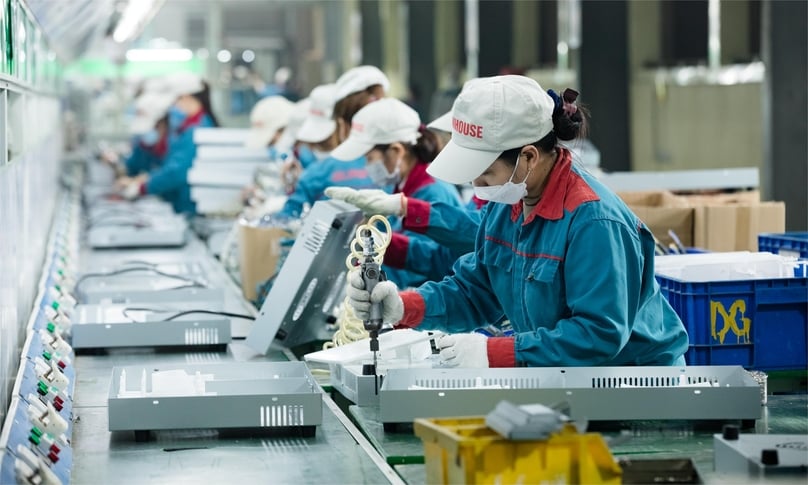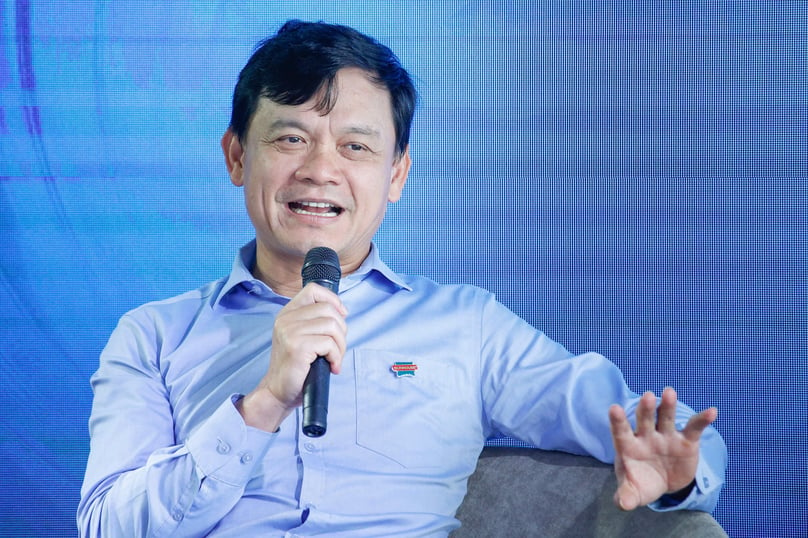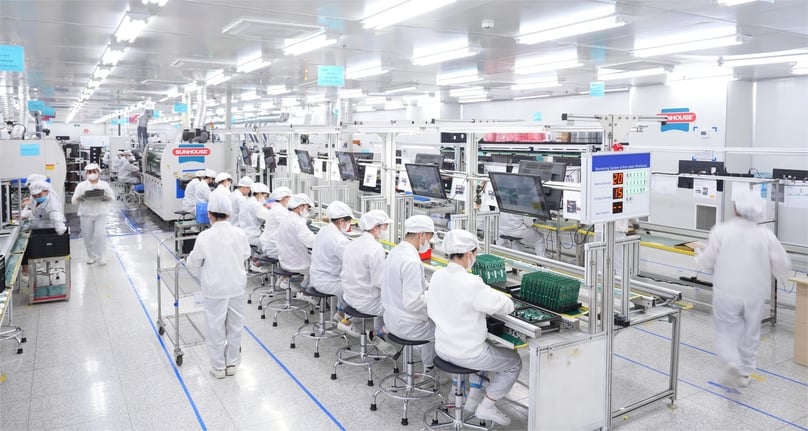Localization must reach at least 80% to compete with Chinese goods: Sunhouse exec
Vietnam is enjoying a huge advantage from the “China+1” wave given the U.S.-China trade war. The country is an alternative destination for many large corporations. No other country has the speed of building factories and growing exports as fast as Vietnam, says Nguyen Xuan Phu, chairman of Sunhouse, a leading home appliance manufacturer.
China is "the world's factory", an extremely important link in the global supply chain. Many giants like Apple and Samsung are outsourcing in China. Therefore, importing Chinese components for production and assembly is a common practice today. However, not few Vietnamese people think that Vietnamese goods with components imported from China, or Vietnamese-branded goods manufactured in China are of poor quality. What do you think about this perception?
Sunhouse has prodution in both Vietnam and China. It is necessary to change the wrong view that manufacturing in China is not good.
China currently produces 80% of global consumer goods. The iPhone is an American product but is made in China. Samsung is a Korean brand but a very big porition is produced in Vietnam. The essence of global manufacturing today is optimization: R&D in places with good brainpower, production where costs are reasonable, and sales in the most efficient markets. Evaluating product quality must be based on quality criteria, governance systems, and brands.
Businesses that want to survive must invest in quality governance. Sunhouse-branded products – no matter where they are produced – must meet the same quality standards. We have built Sunhouse’s own quality goverance system. As we are an original equipment manufacturer (OEM) for some major global brands, we learn and standardize the process.
In Vietnam, state management still focuses on origin, while origin can be completely fraudulent like the phenomenon of importing Chinese goods to Vietnam but labeling them as European to sell at high prices.

A household appliances production line located in the Sunhouse factory cluster on Thang Long avenue, Quoc Oai district, Hanoi. Photo courtesy of Sunhouse.
"Optimize to serve the majority, but still ensure quality". "High quality but reasonable price". How have such directions impacted the business outcomes of Sunhouse?
Currently, Sunhouse rice cookers make up more than 30% of the market share in Vietnam, surpassing Korean and Japanese brands. Non-stick pans account for up to 60% of the market share.
This is the result of investing in real quality. Consumers are very sophisticated; they look at the ratio between quality and price. Sunhouse can absolutely make products as good as those of Germany, but if they sell for VND20 million ($765), who will buy them? So we choose: Optimize to serve the majority, but still ensure quality.
For example, LED lights. We produce from A to Z – from circuits, drivers to mechanical frames – at a Sunhouse factory which is expected to export more than VND1,000 billion ($38.25 million) to the U.S. this year.
But in the domestic market, we sometimes still have to import from China because we are not capable of producing with a large scale or do not have the conditions to open our own molds. But Sunhouse controls all technical standards, so the products are still of high quality – that is the difference between a systematic and unsystematic brand.
We are transparent. Which products Made in Vietnam, which Made in China are clearly stated; we never cheat on the origin.
Looking at the world, why are Japanese and American products good? Because they have had hundreds of years to build quality management systems, creating standards for businesses. But because of that, the price is high, losing competitive edge in the mass segment. That is the reason why "too perfect" brands like Panasonic gradually lose market shares because consumers are no longer willing to pay high prices.
What is the localization ratio of products at Sunhouse's 10 factories in Vietnam and how does that number affect competitiveness?
Localization must reach 80% or more to be able to compete in both quality and price with Chinese goods - that's the biggest challenge.
At Sunhouse's 10 factories, we are almost entirely self-sufficient in the entire process - any product that we decide to make will be made 80-90% within our factory system. From ovens and microwaves to water purifiers - all are manufactured from A to Z at Sunhouse. We make them ourselves, from microchip research and technical design to mechanical processing and molds.
This is a great source of pride because very few Vietnamese enterprises have such a complete product ecosystem and self-sufficient production capacity. In particular, Sunhouse products have overcome strict technical barriers to export to the two most demanding markets in the world, the U.S. and Japan. Not only can they be exported, but they can also be sold profitably.

A worker at Sunhouse Technologies Factory, an electronics manufacturing facility, on Thang Long avenue, Quoc Oai district, Hanoi. Photo courtesy of Sunhouse.
Given the orientation of becoming a leading OEM (original equipment manufacturer), in addition to prices, production scale will be a requirement for Sunhouse to meet large orders. Economy of scale can also help reduce prices. How does Sunhouse solve this challenge?
Without scale, there certainly cannot be competitive prices - this is the principle in production. However, the extent to which production scale is expanded depends on the ability to forecast market and customer demand. Sunhouse's point of view is to expand in a compatible manner, in accordance with the actual needs of the market.
We make forecasting a top priority – from assessing growth in the coming year and new customer segments to specific market needs – so that we are fully prepared. In every plan, infrastructure, technology and people must always be one step ahead. That is how we build our development strategy – short, medium and long term – to ensure we are always ready to take advantage of opportunities without being passive or surprised.
What are the opportunities to cooperate with Sunhouse for foreign companies? Buying components, ordering under their own brands (OEM), or simply importing finished products from Sunhouse? We know that Sunhouse aims to reap over VND3,000 billion ($114.82 million) in export this year.
Manufacturing is a core element of a country. It is no coincidence that when Donald Trump came to power, he tried to bring manufacturing back to the U.S. Why? Because manufacturing is where inventions are created. If a country does not directly participate in manufacturing, it only takes one generation for the ability to innovate to disappear. History has proven that.
Britain used to be the center of industrialization, then the center moved to the U.S., then Japan, South Korea, and now China. Whichever country dominates manufacturing, that country is the leader in invention. Now, China is the country with the largest number of patents in the world.
Vietnam is enjoying a huge advantage from the “China+1” wave given the U.S.-China trade war. We are an alternative destination for many large corporations in the world. No other country has the speed of building factories and growing exports as fast as Vietnam.
Most major brands have purchased goods or set up factories in Vietnam. This is a golden opportunity for domestic enterprises to participate in the global supply chain. However, unfortunately, most domestic and FDI enterprises still operate separately or have little connection. Vietnamese enterprises have not been able to “crawl” into their supply chains, nor have we learned much.
Personally, I understand this well, so from 2018-2019, I proactively invested in our infrastructure and ecosystem so that Sunhouse can participate deeply in the global production chain.
We have built factories for microchip, plastic injection molding, precision mechanics etc., of which one applies South Korean technology and production lines in line with Samsung's tier-1 supplier standards.
We have made products such as set-top boxes for Deutsche Telekom (Germany), AI stickers for SK (South Korea), and Swiss smart lock control chips. Sunhouse's products have reached the level of sophistication to export to demanding markets.
To participate in the global supply chain, two extremely difficult conditions must be met. The quality system must meet international standards, and the product price must be globally competitive. Many people think it is simple, but for an industrial product to enter markets such as the U.S., Japan and Europe, it is extremely difficult.
Sunhouse now has a very solid foundation - enough to sell components and finished products to foreign partners or become an OEM/ODM (original equipment manufacturer/original design manufacturer). "Vietnamese brand - International standards" is our strategic orientation in the coming time.

Photo courtesy of Sunhouse.
What is Sunhouse's orientation in developing sales via e-commerce? Will you focus on selling on large platforms like Amazon or building your own e-commerce system?
In fact, e-commerce, especially for the industry of small household appliances, will certainly become the main sales channel in the future, when the 9x-2000 generation becomes the main consumer force. This is a group that is tech-savvy, willing to shop online and make decisions very quickly. Sunhouse clearly sees this opportunity, so it considers e-commerce as one of two strategic growth pillars: first, export and second, e-commerce.
We do not aim to build a separate platform to compete with "big guys" like Amazon or Shopee, but will focus on investing in our booths on large platforms, taking advantage of existing infrastructure for development. At the same time, we are also building our own internal e-commerce system to gradually become more proactive in the long-term journey.
In the past two years, Sunhouse has achieved the best growth in the e-commerce channel. That shows that we are on the right path.
There is a risk that the U.S. will impose high tariffs on goods from Vietnam. How will Sunhouse adapt?
The U.S. currently does not have a competitive advantage in the production of consumer goods. Production of ovens or fryers in the U.S. would see its cost double or even triple that in Vietnam. Therefore, the U.S. returning to domestic production is not something Sunhouse is worried about.
What we are most concerned about right now is the competitive advantage in terms of taxes. If the tax rate for Vietnamese goods is higher than that of competing countries such as Thailand, Indonesia, the Philippines and India, that is a big concern. It is even more disadvantageous if the tariff is even higher than that of China.
Therefore, Sunhouse is proactively building many scenarios to cope with the worst-case scenario. We always consider what to do if the tax rate for Vietnam is higher and what if the supply chain sees changes. Also, we always consider how much to promote localization to maintain our competitive edge.
The U.S. may tighten its grip on products originating from or related to China. Sunhouse's high localization rate is an advantage for the company, isn't it?
We expect – based on some speculations – that the U.S. will apply a policy of classifying according to the localization rate. If a product has a low localization rate in Vietnam, high tax will be levied. If that is true, Sunhouse will have a clear advantage because we have invested heavily in domestic production in the past.
However, that is just the expectation. The reality remains to be seen when the U.S. announces a new tax policy on imported goods from Vietnam. If the final decision is unfavorable, it will certainly have a huge impact. We only hope for a competitive tariff. If it is higher, we will have to find solutions to address a new problem.
Currently, Sunhouse is in a waiting state and also carefully preparing for the worst-case scenario regarding tariffs. At the same time, we also hope that Vietnam will make policy adjustments at the government level to increase adaptability and negotiate more effectively.
We also see that the U.S. is very determined to reduce the trade deficit with Vietnam - something they have been talking about for a long time. But that is a macro-level story, beyond the control of businesses. As for businesses, we will have to adapt and choose the most suitable option to survive and develop.

Photo courtesy of Doanh Nhan & Thuong Hieu (Entrepreneurs & Brands) magazine.
Sunhouse is investing heavily in a microchip factory. What do you think about Vietnam's current policies for investment in high-tech industries?
I recently went to China. China has a very practical approach. Each province has its own development investment fund. They choose the key industries they want to focus on developing, then choose a few businesses with aspirations and capabilities to accompany and invest.
For example, in Guangxi, they want to build a display factory. The government chooses suitable enterprises to co-invest. During the implementation process, if the private enterprise makes mistakes, the government still sticks to the project. They recruit a team of Korean experts and invite the director of Samsung Display China to manage everything from construction and product deployment to sales. That is, China chooses the industry, chooses enterprises with aspirations, and then invests and provides very specific support.
Sunhouse has invested $20 million in our microchip factory, and it has recorded a loss of VND150 billion ($5.74 million). That's the way high technology is. If Vietnam really wants to transform the economic structure, develop key industries, and create core values, there must be businesses that dare to do it. But if they dare to do it, there must be people who "shoulder" initial risks together with them.
I expect the government to thoroughly study the models of leading countries like China and South Korea because they have done it successfully. Vietnam must make stronger breakthroughs to be able to follow and surpass them.
Enterprises and the state must discuss together: to win in global competition, we must create specific advantages - in technology, costs, and human resources. To enter the high-tech industry, we must choose the right field, invest deeply, and accept losses in the early stages. Otherwise, we will die halfway.
We need enterprises that dare to do it, the state that dares to accompany us, and we must consider it a "battle" - we must know what weapons to use to win in the global competition war.
That is my biggest expectation: Policies must create real competitive advantages for Vietnamese enterprises, so that they can win in new fields, especially high technology such as AI and semiconductors. Such fields require tens of billions of USD in investment, and will certainly suffer losses in the first many years.
However, our biggest "stumbling blocks" at present are the institutions and management mechanisms at local levels.
Could you elaborate on the difficulties related to the institutions and management mechanisms at local levels?
For example, my factory often has to adjust the layout and production lines to meet customer requirements. Each time, I have to again seek approvals related to fire prevention and fighting, construction permits, expansions, etc. These things seem small but they discouraged businesses.
Sometimes, we don't do business for ourselves or for our family anymore, as our material life is enough. We do it for a bigger responsibility, for the country, for the Vietnamese manufacturing industry. If the opportunity comes to us and we don't do it, we feel guilty.
The opportunities are there. International partners have come. But policies, institutions and human resources are currently barriers. For example, it is extremely difficult to recruit workers now. Vietnamese salaries in Region 1 (large urban areas and districts in centrally-governed cities like Hanoi and HCMC) are higher than in China. Young workers are not interested in manufacturing - they prefer service and office work.
I once went to a South Korean semiconductor factory. The working conditions were extremely strict and closed. Sunhouse is also building a clean room factory with very high standards.
Real production is very hard. It is not easy to earn a legitimate penny. But if you can overcome it, the opportunity will be huge. Today, Sunhouse has enough capacity and foundation to welcome all international cooperation opportunities - from OEM, ODM to exporting finished products and components.
What about the quality and discipline of Vietnamese workers? Is it an advantage or a disadvantage for businesses?
Vietnam's current legal regulations are generally quite complete. So where is the fault? The biggest weakness of many Vietnamese people is their lack of discipline and seriousness.
I myself often share that Sunhouse still cannot be called as good as desired. Why? Because although the leaders have the will and determination, whether the system below can actually implement it or not is another story.
It’s like the law: it exists, but the important thing is whether the implementing unit seriously implements it. That shows that we really need a comprehensive education at the national level – to form the right standards, encourage the right actions, and change the mindset and attitude of workers.
To change that, we must start with education – educating the spirit of doing the right thing, thinking the right way, and acting the right way. We must build a national culture, like the way people think of Japan or Germany when they mention discipline and punctuality.
We must understand that if we do wrong, in the long run we will be the ones to suffer the consequences. So let's be proactive to do the right thing - when everyone does the right thing, the whole system will improve. We produce good pans, others sell clean meat - the whole community benefits. On the contrary, if we deceive others, someone else will deceive us back.
Therefore, the core thing is that each individual must change themselves to move towards the right standards. Then, society will develop together. But this is also the most difficult thing.
The key is to build a culture: a culture of discipline, a culture of doing the right thing. When that becomes a habit, the gap between law and enforcement will gradually be eliminated.

